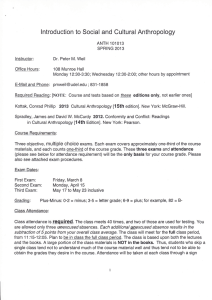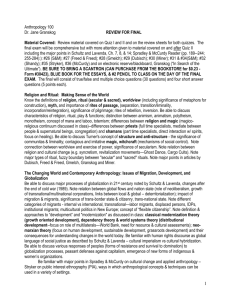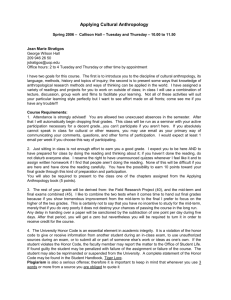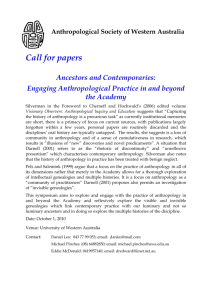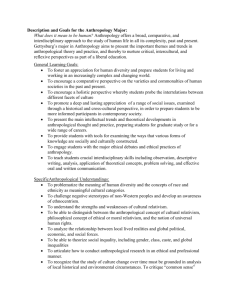(Ricke) - DePauw University
advertisement
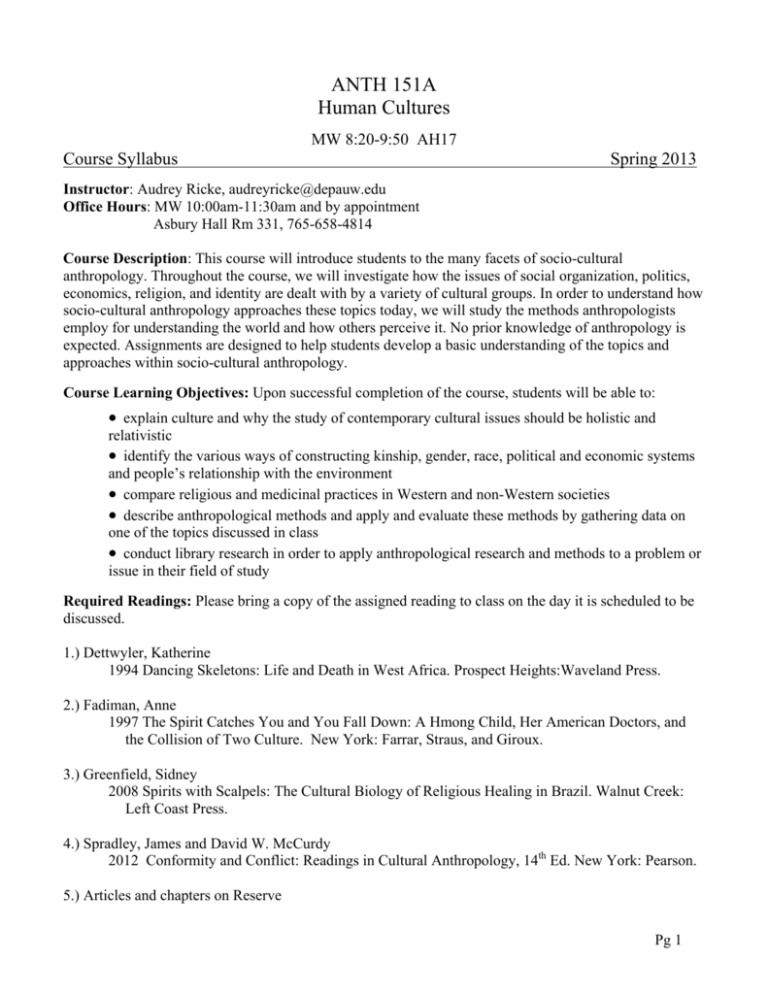
ANTH 151A Human Cultures MW 8:20-9:50 AH17 Course Syllabus Spring 2013 Instructor: Audrey Ricke, audreyricke@depauw.edu Office Hours: MW 10:00am-11:30am and by appointment Asbury Hall Rm 331, 765-658-4814 Course Description: This course will introduce students to the many facets of socio-cultural anthropology. Throughout the course, we will investigate how the issues of social organization, politics, economics, religion, and identity are dealt with by a variety of cultural groups. In order to understand how socio-cultural anthropology approaches these topics today, we will study the methods anthropologists employ for understanding the world and how others perceive it. No prior knowledge of anthropology is expected. Assignments are designed to help students develop a basic understanding of the topics and approaches within socio-cultural anthropology. Course Learning Objectives: Upon successful completion of the course, students will be able to: • explain culture and why the study of contemporary cultural issues should be holistic and relativistic • identify the various ways of constructing kinship, gender, race, political and economic systems and people’s relationship with the environment • compare religious and medicinal practices in Western and non-Western societies • describe anthropological methods and apply and evaluate these methods by gathering data on one of the topics discussed in class • conduct library research in order to apply anthropological research and methods to a problem or issue in their field of study Required Readings: Please bring a copy of the assigned reading to class on the day it is scheduled to be discussed. 1.) Dettwyler, Katherine 1994 Dancing Skeletons: Life and Death in West Africa. Prospect Heights:Waveland Press. 2.) Fadiman, Anne 1997 The Spirit Catches You and You Fall Down: A Hmong Child, Her American Doctors, and the Collision of Two Culture. New York: Farrar, Straus, and Giroux. 3.) Greenfield, Sidney 2008 Spirits with Scalpels: The Cultural Biology of Religious Healing in Brazil. Walnut Creek: Left Coast Press. 4.) Spradley, James and David W. McCurdy 2012 Conformity and Conflict: Readings in Cultural Anthropology, 14th Ed. New York: Pearson. 5.) Articles and chapters on Reserve Pg 1 ASSIGNMENTS – 1. Participation 2. Fieldwork Project 3. Anthropology in the News 4. Applying Anthropology Paper 5. Exams Midterm Final 50pts (10%) 75pts (15%) Feb 20 60pts (12%) Based on Sign-Up 100pts (20%) April 22 100pts (20%) March 6 115pts (23%) May 15 TOTAL = 500pts Please see Moodle for a handout on how to write an essay and the evaluation section in this syllabus for how assignments will be graded. These criteria apply to all of the assignments. It is your responsibility to ask any questions you may have about the assignment prior to its due date. All out of class assignments: • must be submitted to Moodle AND a typed, stapled hard copy must be turned in by the beginning of class on the due date to potentially receive full credit. Unless prior arrangements are made, 10% will be deducted from the earned grade each day the paper is late. • must be typed in 12pt Times New Roman or similar font with 1 inch margins. • must include in-text citations and a reference cited page for any ideas, data, or other information that is not solely yours. It is your responsibility as a student to know what plagiarism is and to avoid it. I strongly suggest that you visit the links listed under plagiarism in the policy section of this syllabus. o All citations must follow the American Anthropological Association style guide which is found at http://www.aaanet.org/publications/style_guide.pdf. 1.) Participation - Contributions to class discussions are essential and will prepare you for the assignments and exams. Please read the assigned texts before the date they are scheduled on the syllabus. Class discussion will be dismal at best if you do not come prepared and being prepared involves more than reading the article. For each reading, answering the following questions in your notes and bring them to class. If you do not know the answers, you will not be able to successful participation in the class activities. 1. In one or two sentences, what is the author’s main point? 2. How does this reading (author’s approach, main points, key concepts) relate to what we have already read and to current events? 3. What is one question you have after completing this reading? Pg 2 Part I: 10 times throughout the course, you will be graded on your class preparedness. You will be asked to complete short out-of-class or in-class exercises, such as quizzes or written responses to readings. Each exercise will be graded on a 3pt scale: • 3pts -complete and accurate response, provides specific examples and comments • 1pt- generic response, some parts are missing or not accurate, and/or does not follow instructions • 0 pts- large portions missing, inaccurate, or late If you miss an in-class or out-of-class activity due to an excused absence, you may make up a maximum of 3 missed participation exercises. It is the students’ responsibility to check Moodle for any in or out-ofclass participation exercises they have missed and turn in the work by the next class period. Part II: Class discussion- You should contribute to class discussion as much as possible throughout the course. Your level and quality of engagement will be graded throughout the semester. Contributions should be meaningful in the sense of helping to advance the discussion of the topic and be grounded in the readings. This will require you to be actively listening to what others are saying and think about how you can build on or change the direction of the discussion to contribute your own, unique ideas. This portion of your participation grade is worth 20 points. Examples of varying levels of participation from greatest to least: • volunteers reflections on the week’s readings that contribute a new idea or understanding, goes beyond a short comment on a daily basis • volunteers a brief comment or gives a comment after being asked by the instructor or another student to respond once every week or two • offers very few comments, absent, or disrupts class i.e. via leaving the classroom, arriving late, making inappropriate comments, or using or having out any type of electronic device 2.) Fieldwork Project- this project is designed to provide you with hands-on experience in methods used by anthropologists. Face to face interviews are a good way to learn more about a cultural practice. For this assignment you will select a cultural practice that you would like to learn more about and interview three people who are involved in the practice. A few examples of possible topics are Japanese cooking, Chinese New Year celebrations, or southern Indiana traditions. The goal of this assignment is to learn more about a cultural practice and how it is integrated (one part is connected to another) with other aspects of culture. You will write a 2 pg double-spaced report on your findings, including a reflection on the methods. Please turn in a hard copy of your notes (these do not count toward the report’s page limit) with your report in class on the due date. You only need to upload the report to Moodle. Be prepared to discuss your results in class. What questions should I ask? Write a total of 10 questions that will give you specific information about the cultural practice, such as the who, what, when, where, why and how it is related to other aspects of culture. Limit or avoid yes or no and close-ended questions as these can restrict the amount of data collected. In class, we will go over tips on how to write interview questions. You may need to do some preliminary research on your topic to help you write the questions. It is fine if the questions turn out to not be perfect. Part of this exercise is to reflect back on what did and did not work so it is expected that you may encounter some problems with some of your questions. As long as an honest effort is made in writing the questions and following the tips, you should be fine. Pg 3 How should I conduct the interview? Interviews done in person often reveal additional information not available in written surveys. For this assignment, the interviews MUST be conducted in person and verbally. This means that you should NOT hand a person a survey or questionnaire and ask them to write out the answers, but rather you should verbally ask them the questions and write down their responses. You may do a video interview over skype or other similar live video medium. If you have access to an audio recorder, you may also want to record the interview given first the person’s permission. Whether you use a recorder or not, you must take hand-written notes. This is an important practice for anyone who does ethnographic interviews. As any seasoned anthropologist will tell you, technology does not always work. Do not waste your interviewee’s or your own time by relying solely on your memory or equipment. Your notes should be hand-written. You do not have to record every word, pause, or gesture of the person, but the notes must contain the person’s complete response to each question. Who can I interview? – You may interview any person who is or has been involved in the cultural practice that you picked. How should I write up the report? The report should be 2 to 3 pages double-spaced. The first half of the paper should be a summary of your results as it relates to how the cultural practice is integrated with other facets of culture/society. This is NOT a line by line statement of what each person said for each question. Rather, you should summarize and explain the themes in the responses. Focus on a couple of the strongest or most surprising connections rather than try to include all of them. To discover these connections, look through your data for any patterns –such as women generally do a particular practice because of what society considers masculine or feminine. Be sure to include some specific examples from your interviews in your explanation to back up your conclusions. For the second half of your paper, reflect on your methodology. What worked well and why? What problems did you encounter in doing this assignment? How could you solve the problems? Since this is a pilot study, the sample size is not going to be representative. Do not worry about this, but rather focus on the issues you encountered, both positive and negative. Examples of incomplete explanations or solutions are “because I did/did not get the answers that I expected,” “because I would get longer responses”, “I would write different questions” and similar comments because they are too generic and really say very little about the problem and solution. 3.) Anthropology in the News: This assignment is designed to give you experience conducting library research and summarizing main points. In order to better understand how our readings connect to current events, each student will lead a 5 minute discussion of a current news story related to one of the topics (bolded titles in the reading schedule) that we are discussing this semester. During week 2, you will sign up for the day that you will present and prepare a presentation and paper based on the article that you found which correlates with the week’s topic. Please follow the instructions below to complete the assignment. The assignment is due at the beginning of class on the day that you signed up to present. Turn in a hard copy of the newspaper or magazine article with your paper. • Find an article that is about an anthropological study or written by an anthropologist and was featured in a mainstream newspaper or magazine that was published in the last five years. Some examples of mainstream newspapers are the New York Times, Washington Post, Chicago Tribune and some examples of mainstream magazines are National Geographic and the New Yorker. Pg 4 o We will overview in class how to search databases. Keep in mind that if you pick too narrow or too broad of search terms nor use the proper coding when searching, you will not be able to find an article. For example, “gender” might be too technical for a news article but using “women” or “men” may increase results. While librarians are able to help you with search codes and terms, they may not be familiar with specific anthropological terms or past studies. It is your responsibility to start early on this assignment in case you encounter problems and need to ask me for assistance. o If you find an article that is outside this time frame but would like to use it, please email a pdf or bring a hard copy of the article to me for possible approval please note that some older articles on certain topics can be out of date. • Write a 1.5 page double-spaced summary of the news article and how it relates to one of the topics we have been discussing in class. o at least ½ of the paper should be devoted to a well-developed discussion of how the article relates to one of the topics we are discussing. Well-developed discussions should include specific examples from the reading and news article to justify the connections you are making. Generic statements, such as “both articles are about x,” are not sufficient. o Write one discussion question based on the article and the reading. Rather than yes or no questions or asking about facts, good discussion questions focus on the themes within the readings and are why and how-type questions which encourage conversation and could be discussed by anyone who has read the course material. For example, you could ask a question that has students connect the material from the newspaper article with the assigned reading or debate a particular issue that arises from the reading and article. • On the day that you are assigned, lead a 5 min presentation and discussion based on your summary and discussion question. 5.) Applying Anthropology Paper- This assignment is designed to give you experience applying anthropological concepts and methods to your field of study. Interdisciplinary projects and cross-cultural knowledge are increasingly being valued in many job markets. For this assignment, you will use what you have been learning about anthropology to explore a problem that you may face in your future major. How do I pick a topic? Think of one issue or problem related to people that involves your major. The issue does not have to be exactly about your focus within your major. For example, if you want to be a mechanical engineer for an aircraft company, you may want to search more broadly for anthropological studies related to how people use products, which can help you design these products more effectively and anticipate how these products can break and adjust the design according. If your major is undecided, select a major that interests you. As you decide on a major, it is good to explore the most common problems you might face in that career. If your major is anthropology, think of an issue within anthropology that you would like to focus on in the future. Pg 5 How do I write the paper? Find two academic anthropology journal articles which contain case studies that would be applicable to the issue or problem which you have chosen. (A case study is a set of raw data that is collected and analyzed in order to make a point. Our reading on Japanese-Brazilians is a good example of a case study.) Drawing on what you have learned in this course, explain how the information in the articles can be used to help deal with your selected issue or problem. You do not need to solve the problem completely. Rather, you can use the two anthropological case studies to suggest and justify future directions or important factors that need to be considered. This is NOT a comparison paper of anthropology and your major. In addition to the handout on how to write an essay, here are some guidelines: • Introduce the problem in the discipline you will be addressing (limit to ½ page) • Include a thesis statement-one sentence that contains the points/arguments you make in your paper o Example: Anthropological studies of the relationship between health and religion can help nurses better address the potential barriers of successful treatment through ________ and ________. • Make an argument about how this data can be used to address the issue/problem. Do not just summarize the case studies and end with a sentence stating it can be applied to the problem. Use the data to come up with a hypothetical plan- this will require you to foreground your own ideas and use the information you found in a unique way. • The paper must be 4 double spaced pages plus references cited. • The two anthropology case studies must come from different academic articles. If you are using an anthropological article found in an academic, non-anthropological journal (i.e. anthropology or anthropologist not contained in the journal title), you must submit proof that the author is an anthropologist, i.e. has a PhD in anthropology or teaches anthropology courses for an anthropology department. This information is often contained at the beginning or end of the article or is listed on university and other professional websites. Print out the webpage or article page with this information and include it with your paper. o A list of anthropology journals can be accessed via AnthroSource. o This is specifically for your own benefit. Students commonly mistake articles that use interviews or involve “other” cultures as anthropology when the studies are actually by other social scientists. These are preventable mistakes. 6.) Exams: The exams will be essay-based and comprehensive with a focus on the material covered since the last exam. Make-ups for those who miss the exams will only be allowed in extreme circumstances, and prior arrangements with the instructor and official documentation must be obtained. Evaluation: A 94%+ A- 90-93% B+ 87-89% B 84-86% B- 80-83% C+ 77-79% C 74-76% C- 70-73% D+ 67-69% D 64-66% D- 60-63% F 59-0% Grades are not based on effort but on your command of the material, the originality of your work, how closely your work fulfills the requirements of the assignment, and how well-written it is. Your work should follow standard English writing conventions, which means few if any spelling or grammar Pg 6 mistakes; introductory and conclusion paragraphs in papers, thesis statements, and topic sentences in essays. This is standard expectations that you will find at most if not all classes at DePauw and universities across the United States. It is your responsibility as a student to keep asking questions until you understand the assignment or concepts in the course. I do NOT read minds and can only help you if you ask questions about the material in class and during office hours/appointments. Asking questions and making mistakes are important components of learning. Please come see me in my office for questions related to your scores on assignments or exams. Email or speaking immediately before or after class does not allow for sufficient discussion of questions and concerns. I will schedule appointments no earlier than 48 hours after returning the work and no later than 1 week. This 48-hour waiting period is for your benefit and to ensure that you have enough time to thoroughly look over my comments and your work as well as collect your thoughts before coming to see me. Please read all of my comments written throughout the document, not just the summary score at the top of the page. These discussions may result in a decrease, increase, or no alteration in the score. The main goal is to promote and ensure your mastery of the material as well as analytical and writing skills. The following description written by Professor Angela Castaneda will help you better understand the criteria for graded material: “A= exceptionally thought-provoking, original, creative in both content and manner of presentation, and a skillful use of concepts and/or materials which are fully supported. B= presents a solid understanding of the subject matter and an ability to handle the issues and materials encountered in the subject with only minor errors. C= demonstrates an adequate understanding of the subject matter with central ideas present, but too general, repetitious and not clearly supported or integrated with evidence and details. D= a minimally acceptable performance with a confusing central idea and lacking details. Parts of the assignment are missing and/or incomplete. F= shows lack of effort and minimal comprehension of material with major mechanical errors, no thesis, and misuse of key concepts.” Policies and Accommodations ABSENCES & TARDINESS – In order to limit distractions for your fellow students, please arrive on time and remain until the class officially ends. Participation points will be deducted for arriving late, leaving during class and returning, or leaving early. Per university policy, students may be excused from class in order to observe religious or official university athletic obligations. Please contact me in advance about a possible excused absence in order that accommodations, if applicable, may be made. Proper documentation is required. Pg 7 ACADEMIC INTEGRITY POLICY – DePauw’s policy states that “cheating, plagiarism, submission of the work of others, etc. violates DePauw policy on academic integrity and may result in penalties ranging from a lowered grade to course failure or expulsion.” (http://www.depauw.edu/files/resources/tipsplanningcoursesyllabi2.pdf) Please see the following link for more information about the university’s academic integrity policy. http://www.depauw.edu/handbooks/academic/policies/integrity/ A self-tutorial, which includes examples and a detailed explanation of plagiarism, can be found at http://www.indiana.edu/~istd/. I strongly encourage you to visit this website in order to confirm your understanding of plagiarism. Neither DePauw nor any other university accepts ignorance of these rules as a justifiable excuse. STUDENT DISABILITY SERVICES – “DePauw University is committed to providing equal access to academic programs and University administered activities with reasonable accommodations to students with disabilities, in compliance with the Americans With Disabilities Act and Amendments (ADAAA). Any student who feels she or he may need an accommodation based on the impact of a disability or learning challenge is strongly encouraged to contact Pamela Roberts, Coordinator of Academic Success and Student Disability Services for further information on how to receive accommodations and support. Academic Success and Student Disability Services is located at 101 E Seminary St. 765-658-6267. It is the responsibility of the student to share the letter of accommodation with faculty and staff members. Accommodations will not be implemented until the faculty or staff member has received the official letter. Accommodations are not retroactive. It is the responsibility of the student to discuss implementation of accommodations with each faculty and staff member receiving the letter.”-quoted from Pamela Roberts’s Handbook on Academic Success & Student Disability Services ELECTRONIC DEVICES IN CLASSROOM – In order to promote a distraction-free, learning environment, please keep all laptops, cell phones, and other similar devices TURNED OFF and STORED OFF YOUR DESK & LAP throughout the duration of the class period. Such electronic devices disrupt discussion; they are distractions that draw your attention away from your fellow students and my comments. If you choose to use or have out such devices, 5 points will be deducted from your participation score for each incidence. The syllabus is subject to change, and every effort will be made to notify you well in advance. Pg 8 READINGS Week 1 Anthropology & Culture Jan 28 Introduction to Anthropology Jan 30 Spradley & McCurdy Culture & Ethnography pg 2-5 Spradley & McCurdy Body Ritual Among the Nacirema pg 287-292 Dettwyler, Katherine. 1994. Dancing Skeletons: Life and Death in West Africa. Long Grove: Waveland Press, Inc. Chapters 1 & 2 pg 1-24 Week 2 Cultural Relativism & Methods Feb 4 Dettwyler, Katherine. 1994. Dancing Skeletons: Life and Death in West Africa. Long Grove: Waveland Press, Inc. Chapters 3-4 pg 25-48 Shweder, Richard. 2000. “What about ‘Female Genital Mutilation’? And Why Understanding Culture Matters in the First Place. Daedalus 129(4):209-232. Feb 6 Spradley & McCurdy Fieldwork on Prostitution in era of AIDS pg 20-30 Spradley & McCurdy Nice Girls Do Not Talk to Rastas pg 31-36 Dettwyler, Katherine. 1994. Dancing Skeletons: Life and Death in West Africa. Long Grove: Waveland Press, Inc. Chapters 5-7 pg 49-90 Sign-up in class for Anthropology in News Topics/Dates Week 3 Applying Anthropology: Feb 11 Spradley & McCurdy Culture Change & Applied Anthropology pg 336-339 Spradley & McCurdy Using Anthropology pg371-381 Dettwyler, Katherine. 1994. Dancing Skeletons: Life and Death in West Africa. Long Grove: Waveland Press, Inc. Chapters 8-10 pg 91-130 Feb 13 Dettwyler, Katherine. 1994. Dancing Skeletons: Life and Death in West Africa. Long Grove: Waveland Press, Inc. Chapters 11-14 pg 131-164 Pg 9 Week 4 Family Feb 18 Spradley & McCurdy Kinship & Family pg 151-155 Spradley & McCurdy Family and Kinship in Village India pg 165-171 Spradley & McCurdy Polyandry When Brothers Take a Wife pg 172-178 Feb 20 Spradley & McCurdy Mother’s Love Death Without Weeping pg 155-164 Stoller, Paul and Cheryl Olkes. 2005. “Thick Sauce: Remarks on the Social Relations of the Songhay” In The Taste Culture Reader: Experiencing Food and Drink, Korsmeyer, Carolyn, ed. Pp 131-144. Oxford: Berg. Fieldwork Papers Due Week 5 Subsistence, Politics, & Law Feb 25 Spradley & McCurdy Spradley & McCurdy Spradley & McCurdy Ecology & Subsistence pg 69-72 The Hunters: Scarce Resources in the Kalahari pg 73-86 Forest Development the Indian Way pg 105-114 Feb 27 Spradley & McCurdy Spradley & McCurdy Spradley & McCurdy Law & Politics pg 227-229 Cross-Cultural Law: The Case of the Gypsy Offender pg 230-237 Life Without Chiefs pg 238-245 Week 6 Economics March 4 Spradley & McCurdy Economic Systems pg 115-118 Spradley & McCurdy Reciprocity and the Power of Giving pg 119-124 Spradley & McCurdy Poverty, Office Work and the Crack Alternative pg125-135 Review for midterm – start looking over and studying your notes at least a week in advance and bring any questions you have about the material that we covered. March 6 MIDTERM Week 7 Identity – Race March 11 Spradley & McCurdy Identity pg 185-188 Spradley & McCurdy Mixed Blood pg 217-225 Omi, Michael & Howard Winant Racial Formations pg 9-15 http://www.understandingrace.org/humvar/index.html - Take the Human Variation Quiz Pg 10 March 13 http://www.npr.org/templates/story/story.php?storyId=11155621 – Simply Slang, or a Culture of Disrespect? – listen to this NPR clip Sheriff, Robin. 2001. Dreaming Equality: Color, Race, and Racism in Urban Brazil. New Brunswick: Rutgers University Press. “Discourses on Color and Race” Pg 29-37 Week 8 Art & Representing Self and the “Other” March 18 Tsuda, Takeyuki. 2000. “Acting Brazilian in Japan: Ethnic Resistance Among Return Migrants.” Ethnology 39(1): 55-71. March 20 Glassie, Henry. 1999. The Potter’s Art. Bloomington: Indiana University Press & Philadelphia: Material Culture. The Potter’s Art & Bangladesh pg 17-34 Spradley & McCurdy Village Walks: Tourism & Globalization among the Tharu of Nepa pg 306-315 Week 9 March 25 & 27 = No classes – Spring Break Week 10 Gender April 1 Nanda, Serena. 1985. The Hijras of India: Cultural and individual dimensions of an institutionalized third gender role. Journal of Homosexuality 11(3-4): 35-54 April 3 Spradley & McCurdy Spradley & McCurdy Do Muslim Women really Need saving? pg 208-216 Global Women in the New Economy pg 325-333 Week 11 Communication & Global Issues April 8 Spradley & McCurdy Shakespeare in the Bush pg 41-55 Spradley & McCurdy Whorf Revisited: You are What you Speak pg 49-56 April 10 Caldwell, Melissa. 2004. “Domesticating the French Fry: McDonald's and Consumerism in Moscow.” Journal of Consumer Culture 4(1):5-26. Pg 11 Week 12 Religion & Health Brazil April 15 Spradley & McCurdy Religion, Magic, & Worldview pg256-258 Spirits with Scalpels Intro + chapter 1, 2 pg 9-48 April 17 Spirits with Scalpels Chapters 3-7 pg 49-92 Week 13 Religion & Health Brazil April 22 Spirits with Scalpels Part II pg 93-152 Applying Anthropology Paper Due April 24 Spirits with Scalpels Chapters 14-18 pg 153-205 Week 14 Religion & Health –A Hmong family in the US April 29 – O'Connor, Richard. “De-medicalizing Anorexia. A new cultural brokering.” Anthropology Today 24(5):6-9 Spirit Catches You and You Fall Down Chapters 1-5 pg 3-59 May 1 – Spirit Catches You and You Fall Down Chapters 6-10 pg 60-139 Week 15 Religion & Health –A Hmong family in the US May 6 Spirit Catches You and You Fall Down Chapters 11-15 pg 140-224 May 8 Spirit Catches You and You Fall Down Chapters 16-19 pg 225-304 Review for final – start looking over and studying your notes at least a week in advance and bring any questions you have about the material that we covered. Week 16 Final Exam = May 15 8:30-11:30am Pg 12
